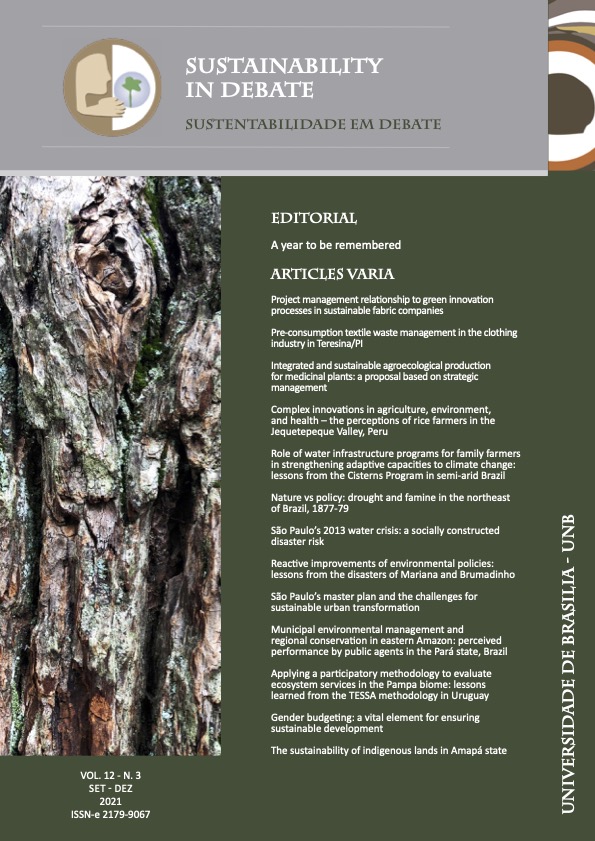Gender budgeting: a vital element for ensuring sustainable development
DOI:
https://doi.org/10.18472/SustDeb.v12n1.2021.38824Palavras-chave:
Gender gap index. Gender parity. Gender budgeting. Public policy effectiveness. World countries.Resumo
The article aims to highlight the latest approaches to the introduction of countries gender budgeting. The authors propose the application of the method of ranking countries based on 4 key indicators related to the gender gap (Economic participation and opportunity, Educational attainment, Health and survival, Political empowerment) of the Global gender gap index and then analyse the result considering the level of socio-economic development of each country. Ten sample countries were randomly chosen. The results of the study confirmed the mutual influence between the gender gap and socio-economic development. The proposed method of ranking countries compared to socio-economic, political and environmental development allows countries with a high value of the gender gap index to offer specific tools to reduce it. The research conducted can help improve existing practices, facilitate initiatives to develop gender parity and further work on geographical and sectoral orientation.
Downloads
Downloads
Publicado
Versões
- 2022-01-11 (2)
- 2021-12-28 (1)
Como Citar
Edição
Seção
Licença
Copyright (c) 2021 Sustainability in Debate

Este trabalho está licenciado sob uma licença Creative Commons Attribution-NonCommercial-NoDerivatives 4.0 International License.
A submissão de trabalho(s) científico(s) original(is) pelos autores, na qualidade de titulares do direito de autor do(s) texto(s) enviado(s) ao periódico, nos termos da Lei 9.610/98, implica na cessão de direitos autorais de publicação impressa e/ou digital à Revista Sustentabilidade em Debate do(s) artigo(s) aprovado(s) para fins da publicação, em um único número da Revista, autorizando-se, ainda, que o(s) trabalho(s) científico(s) aprovado(s) seja(m) divulgado(s) gratuitamente, sem qualquer tipo de ressarcimento a título de direitos autorais, por meio do site da Revista, para fins de leitura, impressão e/ou download do arquivo do texto, a partir da data de aceitação para fins de publicação. Portanto, os autores ao procederem a submissão do(s) artigo(s) Revista, e, por conseguinte, a cessão gratuita dos direitos autorais relacionados ao trabalho científico enviado, têm plena ciência de que não serão remunerados pela publicação do(s) artigo(s) no periódico.
A Revista encontra-se licenciada sob uma Licença Creative Commons Atribuição-NãoComercial-SemDerivações (Proibição de Realização de Obras Derivadas) 3.0 Brasil, para fins de difusão do conhecimento científico, conforme indicado no sítio da publicação, que permite o compartilhamento do texto e o reconhecimento de sua autoria e publicação original nesta revista.
Os autores têm permissão para assumir contratos adicionais separadamente, para distribuição não-exclusiva dos trabalhos publicados na Revista Sustentabilidade em Debate (por exemplo, em um capítulo de livro), desde que seja assinalado que os textos foram originalmente publicados nesta revista e que seja mencionado o DOI correspondente. Os autores têm permissão e são estimulados a publicar e distribuir o seu texto online, após a publicação (por exemplo, em repositórios institucionais ou nas suas páginas pessoais).
Os autores declaram expressamente concordar com os termos da presente Declaração de Direito Autoral, que se aplicará a submissão caso seja publicada por esta Revista.






